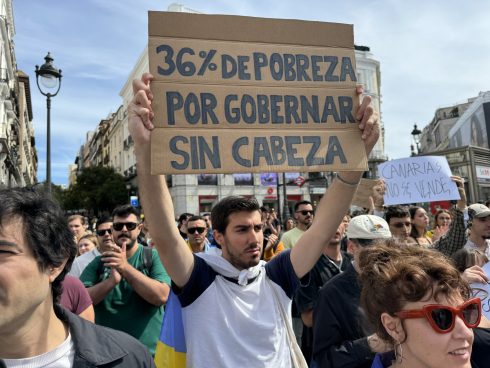DEMONSTRATORS came out in force today in Spain’s Canary Islands in a historic protest against the tourist massification of the archipelago, and the dangers faced by the natural areas on the volcanic land masses.
The protestors are calling for a series of measures to be put in place to alleviate the issues being faced by the residents of the islands, which are located off the northwest of Africa. They include limits on the purchase of properties by foreign buyers in order to combat the shortage of accommodation for locals, an environmental tax, and a freeze on tourist numbers.
One of the focal points of this growing movement against the effects of tourism has been the island of Tenerife, which today saw the biggest turnout of demonstrators.
The slogan of the protests was ‘The Canaries have a limit’, and they were backed with a series of environmental groups including Greenpeace, Ecologists in Action, the WWF, and SEO/Birdlife, among others.

Protestors also came out on the streets of Madrid to join the demonstrations. Hundreds of people gathered in the central Puerta del Sol, carrying placards with slogans such as ‘The Canaries will resist’, and ‘The Canaries are saying enough of tourism’.
One of the groups helping to organise today’s actions is Canarias se Agota (The Canaries Have Had Enough).
Eleven members of that group have been on a hunger strike for this last week in protest against the building of two large luxury projects in the south of Tenerife, The Guardian reported. The group describes the constructions as ‘illegal’ and unnecessary.
According to Spain’s National Statistics Institute (INE), 13.9 million people visited the archipelago last year. The islands have a permanent population of just 2.2 million.
Tourism accounts for 35% of the islands’ GDP. But despite these figures, 34% of residents in the Canaries are living at risk of poverty or of social exclusion, according to the INE.
Experts from the real estate sector, speaking to Spanish media, pointed to a boom in tourist accommodation as one of the roots of the problems facing locals when seeking a place to live.
What’s more, demand from investors has also pushed prices up, and when these properties are purchased, they are put on the market as expensive rentals.
“There is very little supply and that makes prices go up,” Teresa Sanchez, from the real estate agency Ten tu Espacio, told Antena 3. “A one-bedroom apartment a year ago was about €700 [a month] and now they are upwards of €800. There are around 54,000 tourist apartments registered in the Canary Islands, almost 40% more than in 2022.”
The Canary Islands’ regional government is preparing a law to regulate vacation homes on the islands, but it is yet to be passed. So far the Coalicion Canaria-led administration has made public its draft law covering the tourist use of properties. The legislation could be passed at some point this year.
The protests, however, are causing unease within the tourism sector.
“The main tour operator is most concerned about a growing attitude against tourism in Spain, which is making headlines in Germany and other European countries,” said the executive vice-president of Exceltur, Jose Luis Zoreda, in comments reported by The Objective.
“The announced demonstrations in the Canary Islands are perceived in these countries as a sign that tourism is not welcome,” he added.
“An anti-tourism feeling is being fuelled [on the islands] and in this sector, image is everything,” sources from the sector told The Objective.
There have been similar citizen mobilizations in the Canaries in the past, according to Antena 3 news service, such as a protest in 2002 against the installation of pylons in the island’s forest that encroached on several protected areas. More than 100,000 people took to the streets on that occasion.
Meanwhile, in 2014, there were similar joint demonstrations across the islands in protest against oil company Repsol’s plans to carry out prospections off the coasts of Lanzarote and Fuerteventura.
The protests against tourism are not, however, just limited to the Canary Islands. Other parts of Spain are also seeing a growing movement against an excess of visitors, including Barcelona and Sevilla.


